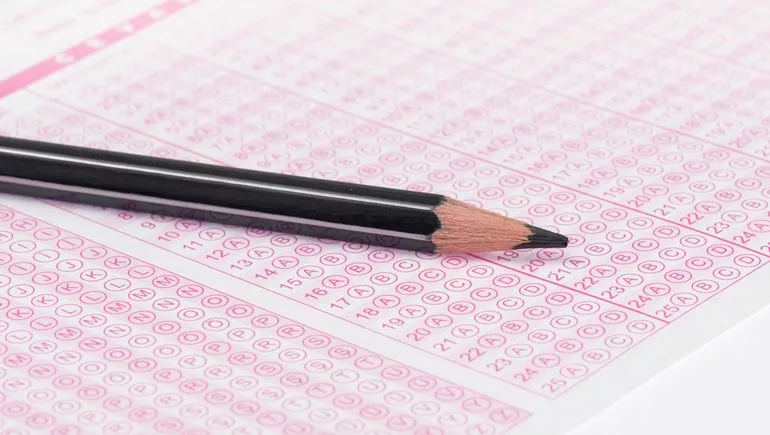[ad_1]
Dive Brief:
- The American Bar Association’s policymaking body rejected a plan Monday that would end the requirement that ABA-accredited law schools use the Law School Admission Test or another standardized assessment in admissions.
- The ABA House of Delegates voted against the change to the organization’s policy that mandates admissions tests — exams detractors say contribute to middling diversity in legal education. Nearly 600 officials comprise the House of Delegates, which took a voice vote on the plan, meaning a precise count was not available.
- However, the proposal isn’t dead. It could be revived and approved unilaterally by the Council of the Section of Legal Education and Admissions to the Bar, another governance panel that OK’d the test-optional policy in November. That’s because although the House of Delegates approves new policy, the U.S. Department of Education recognizes the Council as the arm of the ABA that accredits law schools.
Dive Insight:
For years, the ABA has periodically mulled whether to strike a policy mandating law schools to rely on an admissions exam. This has typically been the LSAT, but in recent years, some institutions have also allowed the Graduate Record Examinations, or GRE.
The ABA formally allowed use of the GRE as an entrance exam in November 2021.
The organization last debated removing all testing requirements about five years ago. In 2018, the proposal didn’t even reach the House of Delegates. It was withdrawn amid concerns that disadvantaged law school applicants would not be able to prove their academic skills without an objective measure like a standardized test. Opposition stemmed from sources like the Law School Admission Council, or LSAC, which administers the LSAT.
Proponents of the test-optional movement were more optimistic last year when the ABA took up the issue again. Test-optional policies exploded in prominence in 2020, when many colleges loosened admissions test requirements for undergraduate students as the coronavirus shut down common exam sites.
Most colleges have not returned to their pre-pandemic policies and are either still trying out test-optional rules or adopting them permanently.
However, opponents of the ABA proposal, like some law school deans, have said assessments offer a clear picture of students’ academic talents. They say weakening a testing requirement would erode the quality of law education.
ETS, the company that runs the GRE, was pleased with the no vote, Alberto Acereda, its associate vice president of global higher education, said in an emailed statement Monday.
And Kellye Testy, LSAC’s president and CEO, said in a statement Monday that the LSAT “is an important tool for advancing diversity.” Testy said the House of Delegates’ move would allow more time to study the effects of test-optional policies on student body diversity.
“We are committed to working with the ABA and the entire legal education community to reconsider these issues and find shared ways to continue to expand access and diversity,” Testy said.
Test-optional supporters cite the same equity-focused reasons for winding down exam requirements at undergraduate colleges and law schools. They argue tests hurt applicants who cannot afford extensive tutoring.
These are disproportionately prospective students who are Black or other members of racial minority groups. Therefore, test mandates contribute to a lack of diversity in legal education, observers say.
A study in Florida International University’s law review in 2019 showed the average LSAT score for Black students was 142, compared to 153 for White and Asian test-takers. The maximum score is 180.
The House of Delegates debated the ABA admission standard change for about an hour. Several representatives said during discussion that the organization should wait until law schools know more about how test-optional policies influence admissions.
The proposal would not have forced law schools to be test-optional. It also would not have kicked in until 2025.
Bill Adams, managing director of ABA Accreditation and Legal Education, said in an emailed statement the Council of the Section of Legal Education and Admissions to the Bar is disappointed in Monday’s vote.
The Council will consider next steps at a meeting Feb. 17, Adams said.
It’s understandable the rule change did not move forward, given the influence it would have had on the law school admissions landscape and aspiring lawyers, Amit Schlesinger, executive director of legal programs at test preparation company Kaplan, said in an email.
Schlesinger said that of the 82 law schools Kaplan communicated with for its 2022 survey of law school admissions officers, half said they would keep standardized testing requirements in place even if the ABA eliminated them.
“If the rules change had been adopted, we think many, if not most, applicants would have continued to submit a LSAT or GRE score, even if they were not required to by a particular law school,” Schlesinger said.
[ad_2]
Source link
Meet Our Successful Graduates: Learn how our courses have propelled graduates into rewarding
careers. Explore their success stories here!
Discover More About Your Future: Interested in advancing your teaching career? Explore our
IPGCE, MA, and QTS courses today!

Explore Our Courses: Ready to take the next
step in your education journey? View our
comprehensive course offerings now!

